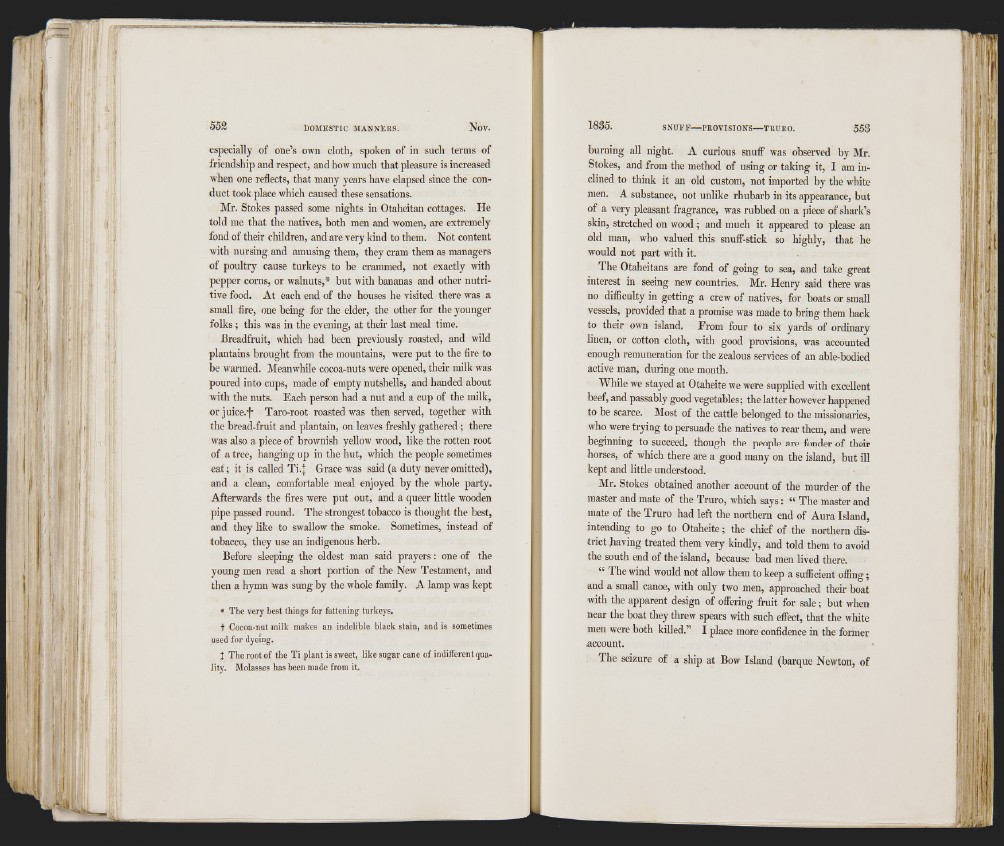
a?
' ;i' 0
I [■ ■
7 u ; ;
.,i, :l
Í;
i p
M ' f I -M ! 4
I! I ! ' j
‘i 1 ll I
' r ;
j
vrj
■‘tiit -
l[' i i f o ' ? 1 1 , 1:.
I' I ■ . - . S J if:
552 DOMESTIC MANNERS.
especially of one’s own cloth, spoken of in such terms of
friendship and respect, and how much that pleasure is increased
when one reflects, that many years have elapsed since the conduct
took place which caused these sensations.
Mr. Stokes passed some nights in Otaheitan cottages. He
told me that the natives, both men and women, are extremely
fond of their children, and are very kind to them. Not content
with nursing and amusing them, they cram them as managers
of poultry cause turkeys to be crammed, not exactly with
pepper corns, or walnuts,* but with bananas and other nutritive
food. At each end of the houses he visited there was a
small fire, one being for the elder, the other for the younger
folks ; this was in the evening, at their last meal time.
Breadfruit, which had been previously roasted, and wild
plantains brought from the mountains, were put to the fire to
be warmed. Meanwhile cocoa-nuts were opened, their milk was
poured into cups, made of empty nutshells, and handed about
with the nuts. Each person had a nut and a cup of the milk,
or juice.# Taro-root roasted was then served, together with
the bread-fruit and plantain, on leaves freshly gathered ; there
was also a piece of brownish yellow wood, like the rotten root
of a tree, hanging up in the hut, which the people sometimes
eat; it is called Ti.] Grace was said (a duty never omitted),
and a clean, comfortable meal enjoyed by the whole party.
Afterwards the fires were put out, and a queer little wooden
pipe passed round. The strongest tobacco is thought the best,
and they like to swallow the smoke. Sometimes, instead of
tobacco, they use an indigenous herb.
Before sleeping the oldest man said prayers : one of the
young men read a short portion of the New Testament, and
then a hymn was sung by the whole family. A lamp was kept
• The very hest things for fattening turkeys.
t Cocoa-nut milk makes an indelible black stain, and is sometimes
used for dyeing.
i The root of the Ti plant is sweet, like sugar cane of indifferent quality.
Molasses has been made from it.
burning all night. A curious snuff was observed by Mr.
Stokes, and from the method of using or taking it, I am inclined
to think it an old custom, not imported by the white
men. A substance, not unlike rhubarb in its appearance, but
of a very pleasant fragrance, was rubbed on a piece of shark’s
skin, stretched on wood; and much it appeared to please an
old man, who valued this snuff-stick so highly, that he
would not part with it.
The Otaheitans are fond of going to sea, and take great
interest in seeing new countries. Mr. Henry said there was
no difficulty in getting a crew of natives, for boats or small
vessels, provided that a promise was made to bring them back
to their own island. From four to six yards of ordinary
linen, or cotton cloth, with good provisions, was accounted
enough remuneration for the zealous services of an able-bodied
active man, during one month.
While we stayed at Otaheite we were supplied with excellent
beef, and passably good vegetables; the latter however happened
to be scarce. Most of the cattle belonged to the missionaries,
who were trying to persuade the natives to rear them, and were
beginning to succeed, though the people are fonder of their
horses, of which there are a good many on the island, but ill
kept and little understood.
Mr. Stokes obtained another account of the murder of the
master and mate of the Truro, which says: “ The master and
mate of the Truro had left the northern end of Aura Island,
intending to go to Otaheite; the chief of the northern district
having treated them very kindly, and told them to avoid
the south end of the island, because bad men lived there.
“ The wind would not allow them to keep a sufficient offing;
and a small canoe, with only two men, approached their boat
with the apparent design of offering fruit for sale; but when
near the boat they threiv spears with such effect, that the white
men were both killed.” I place more confidence in the former
account.
The seizure of a ship at Bow Island (barque Newton, of
M.
I !¡|
èri:
l:'y
ri'I